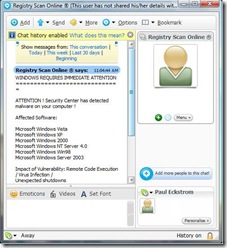Folks, after a quiet period, cyber-crooks are once again using Skype to send phishing "chats" in an attempt to defraud you. So, I am reposting this article. It is the exact same ruse, but the name has changed.
Yesterday a "chat" window (Skype) opened on my machine, and presented me with a dire warning from someone named "Software Update" "Registry Scan Online®". It said that "WINDOWS REQUIRES IMMEDIATE ATTENTION" and, it provided me with a solution. 
(Click on image to see large version)
Please, folks, tell me you have spotted this for what it is. Please tell me that you knew --instantly-- that this is a cyber-crime attempt; that it is Phraud-ulent.
Please tell me that you know what will happen if the link provided in this message is clicked; and, please, please, please tell me you would never click the link.
Just in case you aren't sure:
* "Software Update" "Registry Scan Online ®" doesn't exist.
* "www.onlinemonitor.info" "www.registryscan.com" is not registered in ARIN (the registry of Internet addresses).
* clicking the link will allow scripts to run, and/or take you to a poisoned Website which will install malware on your machine, or/and it may take you to a site that will sell you a rogue anti-spyware program (please read my article, Is that antispyware program really spyware).
* Microsoft DOES NOT alert you via Instant Messaging. No legitimate company does. Period. Ever. This is a classic example of a hacker's attempt to get you to click their link.
All of this so they can rip you off. It's their full time job.
Please point your less-savvy friends and family to this article and educate them to the dangers of spam (unsolicited) messages and tell them-- NEVER CLICK THE LINK.
[Note: while this article directly references the VoIP client Skype, you may see this type of thing in other Instant Messaging/Chat programs.]
Today's free link(s): I have assembled on my Website a collection of links to the best free anti-malware programs to help you prevent infection.. and clean up if you've been infected. To see them, click here.
Also, Bill Mullins has posted a very complete tutorial, Think You Have A Virus?-- Some Solutions, which is quite probably the best one-stop lesson on malware I have ever run across. (I also recommend his How Fake/Rogue Software Affects Real People.)
Copyright 2007-8 © Tech Paul. All rights reserved. post to jaanix

No comments:
Post a Comment